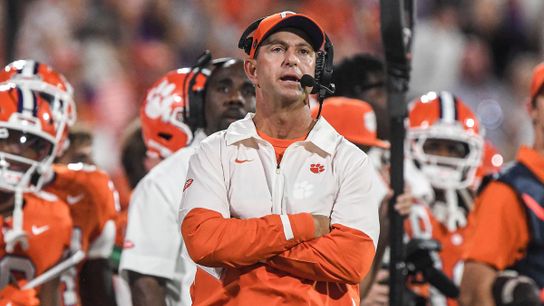There's something that's just off about Dabo Swinney's biography. For a 45-year-0ld head coach of an ACC program, there should be more to it, stops at a dozen or more schools in his climb up the ladder. Instead, Swinney has just two stops: eight seasons as a GA and then full-time assistant at Alabama, and then the last 12 (and counting) seasons at Clemson with a two-year gap in between.
As Swinney remembered it Tuesday in an appearance on the Paul Finebaum show, he'd never be where he is today - 2011 ACC champion, four straight top 25 finishes, Orange Bowl victory, $3 million salary - without his extended detour outside of coaching.
"It was a difficult situation. I went to Alabama when I was 18, I left when I was 31," he said. "So I spent a long time down there and had such a great experience, the good and the bad. Now I can look back and say it was a great learning experience for me. Sometimes you learn more from what not to do than you do the good, and that's kind of what that whole experience for me."
It's easy to gloss over now with Alabama once again on top of the sport, but the sanctions that made Swinney unhireable where very serious at the time." I didn't leave the profession, I couldn't get a job," Swinney remembered, saying he went after the Notre Dame receivers job Urban Meyer vacated after taking the Bowling Green job, but Bob Davie wouldn't hire him. "All of a sudden I'm a young, 25-, 26-, 27-, 28-, 29-, 30-year-old coach and I had an opportunity to leave Alabama after the '99 season and I stay, and nine months later we're all fired."
"They were absolutely staring down the barrel of a gun," the chairman of the NCAA's infractions committee said at the time. With nowhere else in his chosen profession to turn, he jumped into real estate development.
"And so my wife and I, at the time I had a three-year-old and a two-year-old, it had been a difficult time and I just decided, I'm going to take this season off and kind of regroup and really spend some time with my boys," he said. "Really had no intentions of getting out of coaching but Rich Wingo, who was my first strength coach at the University of Alabama and a former great player at Alabama, and he was like, 'Hey, what are you going to do this fall?' And I said, 'Well, I'm probably going to be out and try to get back in after the season.' And so he talks me into coming an working with him and so for the next two years I was in real estate development and learned a lot, traveled the country, learned new things with this company I was with, met a lot of new people and had great success doing something outside of coaching."
It was that time, Swinney said, that turned him into the coach he is today.
"But the best thing is it really made me a better coach and it really gave me an appreciation that I didn't have, I don't think," he said. "I always thought I was a good coach and loved what I did, I always loved what I did, but I just think that the passion for coaching and teaching and impacting people's lives, I just couldn't find anything to fill that void. Even though I was working a 9-to-5 job, at home on the weekends, and I was making more money than I had ever made - we didn't make any money when I was an assistant at Alabama -but that's not why I got into coaching. When I got an opportunity, Tommy Bowden called me and asked if I was interested in getting back into coaching. I said, 'Heck, yeah.' I was really fortunate to get an opportunity. I went to Clemson in the spring of '03 and five-and-a-half years later I'm the interim head coach. Just lucky enough to get the job, right place, right time. Players bought in and six years later we've built a great foundation, so it's been quite a journey."
In the end, Swinney advises young coaches - echoing what Texas A&M offensive coordinator Jake Spavital told us Wednesday - to stay ready because you'll never know when opportunity will strike.
"You've got to prepare for opportunities because you never know when they're going to come and the other is just do a great job with whatever you're doing because you don't ever know who's watching," Swinney said. "When I got called in to be the interim that day, that was kind of what my AD told me. He told me, 'Look, I've watched you for five-and-a-half years and I really believe you can do this job and are ready for this job and for the next seven weeks I want you to be the head coach. Don't be the interim head coach, be the head coach.' I didn't really have a great shot at the job but it kind of gave me some inspiration and belief that, hey, let me make the most of it if I've got a chance here."
